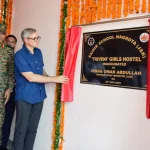Indian Space Research is entering into a new era that will define the nation’s roadmap for Viksit Bharat 2047.This was clearly visible from the 2nd National Space Day celebrations organized to commemorate the successful soft landing of the Vikram rover on lunar space. Indian Space Research Organisation (ISRO) hosted the National Space Meet 2.0 on “Leveraging Space Technology and Applications for Viksit Bharat 2047” at Bharat Mandapam, New Delhi that underlined the Indian policy paradigm on the nation’s space research preparedness. The Meet marks a historic milestone, bringing together Union Government Ministries, State Governments, Private Sector, Academia, Startups, and Experts to shape the next decade of India’s space applications roadmap. A similar national meet was held in 2015, which guided governance and reforms through space-based solutions over the last decade. The new edition sets an ambitious agenda to redefine governance, strengthen citizen-centric service delivery, and harness space technology for socio-economic transformation, aligning with the vision of Viksit harat@2047. It featured 10 breakout sessions, chaired by Secretaries and senior officials of Union Ministries and Departments that include Agriculture & Water, Forests, Environment & Energy Policy, Infrastructure Development & Geo-Governance, Health, Education & Social Welfare, Communication, Navigation & Technology Diffusion, Disaster Risk Reduction, Ocean, Weather, and Earth Resources, North-Eastern Region and Hilly States/UTs, Coastal States/UTs, Inland States/UTs. These sessions engaged hundreds of experts who, over the past four months, worked closely with Ministries, Departments, State Governments, and ISRO to identify hundreds of use cases for immediate and future implementation. Principal Secretary to the Prime Minister of India, P.K. Mishra hailed India’s space journey as a shining example of collective resolve by ministries, states, industries, scientists, and startups. He emphasized that the Meet embodies the ‘whole-of-government’ approach, showcasing how over 60 departments have mainstreamed satellites, navigation, and geospatial tools into governance—from agriculture and health to disaster management and climate resilience. He underlined that that reforms and policies have unlocked unprecedented opportunities. From just one or two startups in 2014, the sector has now expanded to more than 350 startups, some already launching satellites and rockets from Indian soil. He lauded ISRO for creating a vibrant ecosystem by mentoring youth and startups, while reforms such as spectrum allocation, venture capital funds, and technology transfer have made India’s space sector scalable, innovative, and resilient.He urged for institutionalizing the National Space Meet on a regular basis, enabling greater private sector participation, and building a roadmap to integrate emerging technologies such as AI, quantum computing, and big data analytics into satellite and ground systems. He also underlined the need to expand global collaborations, citing the NASA-ISRO SAR mission and the upcoming G20 Satellites for Climate initiative as examples. Underlining the vision for Viksit Bharat 20247 he made it clear that India’s space journey is about empowering citizens, bridging divides, and building a self-reliant nation. As we march towards Viksit Bharat 2047, space will be one of the strongest enablers of growth and transformation. V. Narayanan, ISRO Chairman, traced India’s remarkable space journey from the humble rocket launches at Thumba in 1963 to today’s global recognition of India’s leadership in space. Recalling historic milestones such as the ATS-6 experiment of 1975, he highlighted the contrast between educating 2,400 TV sets in rural India and the present fleet of 55 operational satellites powering broadcasting, telecom, telemedicine, disaster warning, and fisheries monitoring. National Meet 2.0 underlined ISRO’s commitment to “reimagining governance for the 21st century”, using space technology not just for scientific prestige, but for daily service delivery to citizens, aligning with Prime Minister Narendra Modi’s vision of Atmanirbhar and Viksit Bharat.
ISRO’s Roadmap for Viksit Bharat 2047

Sign Up For Daily Newsletter
Be keep up! Get the latest breaking news delivered straight to your inbox.
By signing up, you agree to our Terms of Use and acknowledge the data practices in our Privacy Policy. You may unsubscribe at any time.
Leave a Comment Leave a Comment





